The prophet Joel was the first writing prophet in Judah. His work took place in a very unique time in the nation because it appears that there was no kingly reign at the time. The priests, though, seem to be predominant figures in the book as though they have unusual governmental authority. This event could point to but one time in Judah’s history, when after Ahaziah’s death Athaliah seized control of the throne rather than her infant grandson, Joash. After her six years of power, Joash was anointed king at but the age of seven, therefore Jehoiada, the priest, led the nation until Joash was of age to carry out the duties. This would place Joel’s work and writing around 830 BC, more than two hundred years before Judah’s eventual demise and captivity.
The book itself is commonly recognized to be made up of three particular sections. First, in Joel 1:1-2:27, Joel reminds the people of the locust plague and the drought, attempting to bring the people to repentance. Second, in Joel 2:28-3:16, Joel heralds the day of the Lord to come at which time the Spirit would be outpoured. Then, in Joel 3:17-21, he pictures the glorious future of Judah and Jerusalem upon the people’s repentance.
The first section in which Joel revisits the locust plague and drought pictures a dark day in the land. He emphasizes the extent of the plague by saying “that which the palmerworm hath left hath the locust eaten; and that which the locust hath left hath the cankerworm eaten; and that which the cankerworm hath left hath the caterpillar eaten” (Joel 1:4). Essentially there was nothing left. A locust plague can only be appreciated in its fullest by those who have actually experienced such. One eyewitness account of a locust plague from the early 1900s stated, “A few months afterwards, a much larger army alighted and gave the whole country the appearance of having been burned. Wherever they settled, it looked as if fire had devoured and burnt up everything” (John D. Whitney, “Jerusalem’s Locust Plague,” National Geographic, XXVII 1915, 511-550). The devastation was so complete that Joel said that the fields were wasted, wine and oil failed, and the land mourned (Joel 1:10). Livelihood was taken away, food was made scarce, and lives were lost. And likewise was the devastating effect of the drought which caused the land to not rejuvenate following the plague. These were emblems of God’s wrath upon the people for their sins. But wherein nothing could be done to turn back the hands of time on the plague, God promised the people that upon their repentance they could “be glad then, ye children of Zion, and rejoice in the Lord your God: for he hath given you the former rain moderately, and he will cause to come down for you the rain, the former rain, and the latter rain in the first month” (Joel 2:23). He would restore to them the years suffered and by such would know that He was in their midst and that He is God (Joel 2:25-27).
The second section pictures Christ and the glorious redemption found in Him. Joel prophesies of the day of the Lord to come in which many great things would happen culminating with the outpouring of the Holy Spirit upon those present and the spiritual deliverance made available through the blood of Christ. This is a reference to the day of Pentecost, upon which day Peter referred back to this same prophecy and attributed the events of that day to what Joel had spoken centuries earlier (Acts 2:16ff). However, wherein this is understood to be a blessing of promise, it also is a warning because with deliverance would also come judgment, and except they would repent, they would once again face the judgment of the Almighty God.
The third section looks forward to the glorious future of that nation upon their repentance at which time God would bless them and the land in marvelous ways. God would dwell among them once more and wherein Egypt and Edom would be desolate, Judah would dwell forever and Jerusalem from generation to generation (Joel 3:19-21). God’s blessings are always awaiting those willing to repent, and the glorious blessings awaiting Judah and Jerusalem as promised by Joel are examples of that to all.
Though relatively short, the book of Joel is filled with sadness, sorrow, and pain, but also filled with joy, hope, and anticipation of what was to come for the people. We, too, though are read of in Joel 2, for if we will call upon the name of the Lord, we shall be among those delivered. God’s judgment is sure and set. Are we ready?

